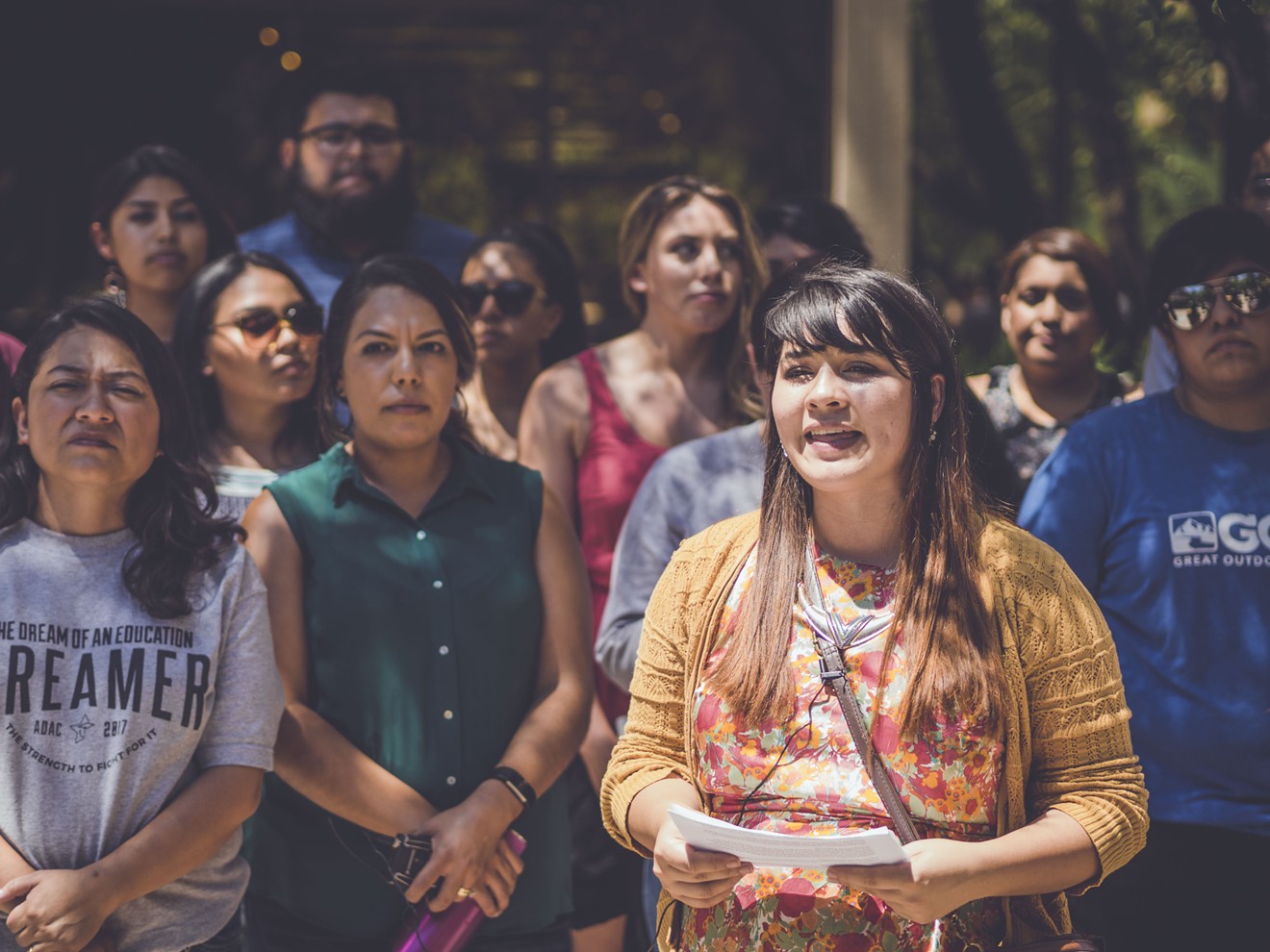The office of the Arizona Dream Act Coalition has an American flag in the window, express envelopes on the front desk, and giant sheets of paper on the wall. The poster-size lists had titles scrawled in pink Sharpie: "How are you processing everything?" "What are some of the things you can do and take action with?"
On Friday afternoon, the organization's president, Karina Ruiz de Diaz, was fielding questions from a roomful of around 30 people, community members concerned about the fate of DACA, or the Deferred Action for Childhood Arrivals program.
One attendee asked Ruiz de Diaz about a possible lawsuit against DACA, and how it might intersect with the timeline for the Dream Act in Congress.
She nodded intently, holding a multicolored bundle of markers. “This is why it’s important for us to fight the two fights," Ruiz de Diaz told the room. "We cannot throw up either one of the balls."
Organizers for undocumented immigrants in Arizona are gearing up for a two-front fight: They are lobbying for the reintroduced Dream Act in the Senate and, at the same time, urging the administration to shield immigrants who arrived in the U.S. as children from deportation.
"If they end DACA, we are going to be targets for deportation, long story short. That’s the reality of it. And that’s why it’s so important for us to put pressure," Ruiz de Diaz told the group. "The government needs to understand that it’s not responsible for them to end DACA before they have a permanent solution."
On Thursday, Senators Dick Durbin (D-Illinois) and Lindsay Graham (R-South Carolina), announced legislation that would create a pathway to citizenship for longtime residents whose parents brought them here illegally as children: the Dreamers. Requirements include working legally for three years, pursuing higher education, or serving in the military.
In response, on Friday evening, the Arizona Dream Act Coalition and Undocumented Students for Education Equity at Arizona State University each held events to discuss action on immigration laws. And on Thursday, Aliento, an advocacy and arts organization for undocumented youth in Phoenix, held a rally outside Senator Jeff Flake’s Phoenix office.
Aliento's founder and executive director, Reyna Montoya, told Phoenix New Times that the fight for protection from deportation has been a long road.
"The Dream Act has been introduced since 2001. I was 10 years old at that time, and now I’m 26," said Montoya. "We’ve gone through it all, even with President Obama."
Speakers from Aliento spoke about what the bill means for them and their families. Despite the willingness of Flake and others to support a pathway to citizenship, Montoya said organizers are still cautiously waiting to see the final language of the bill.
"On the other hand, we’ve very concerned, because we don’t know what’s going to happen to DACA," Montoya said.
Enacted in 2012, DACA allows undocumented immigrant youth to work and live in the U.S. without fear of deportation, with some caveats, such as a criminal-background check. Approximately 800,000 people have applied for DACA protections and, by some estimates, a million people could qualify. If the new Dream Act passes, young people protected by DACA would receive conditional permanent residency.
But under Trump, DACA is in serious danger.
The administration has been treading around the program. Since he took office, Trump and the Department of Homeland Security have signaled that DACA recipients will not be targeted for deportation. Nevertheless, in June, DHS Secretary John Kelly said that DACA remains “under review.”
In theory, Trump could end DACA with the stroke of a pen. The Obama-era program was carried out as an executive order and, as a result, is easily reversible. That kind of stress and uncertainty can weigh on immigrants who have made a life here, Montoya said.
"What’s going to happen to the destiny of close to 1 million people?" she asked.
Now, dueling coalitions of attorneys general are lobbying the Trump administration on DACA. The attorneys general of nine Republican-led states warned Trump in a letter last month that they would sue the administration if it does not phase out DACA by September 5. And last week, Kelly suggested that the administration would not defend DACA if the program ended up in court.
Nevertheless, other attorneys general came out in support of protecting undocumented immigrant youth. In response to the threat of a lawsuit, attorneys general from 19 other states and the District of Columbia have urged Trump to keep the program in place.
“The consequences of rescinding DACA would be severe, not just for the hundreds of thousands of young people who rely on the program — and for their employers, schools, universities, and families — but for the country’s economy as a whole,” the 20 attorneys wrote in a July 21 letter.
James Garcia, the director of communications and public policy at the Arizona Hispanic Chamber of Commerce, said the chamber supports DACA and the proposed Dream Act legislation. He told New Times that "muddled, contradictory" messages from Washington have all-too-real effects on young people working or studying in Arizona.
"It is difficult enough for these young people to plan a future as a DACA recipient. That’s hard enough," Garcia said. "To plan with contradictory and even mean-spirited messages coming out of Washington and the Trump administration is nothing short of cruel. I can’t even begin to imagine what’s going through the mind of someone who has DACA, who’s making a living or running a business, when they hear what’s coming out of Washington right now."
The contradictory messages have had an impact on Raul Tapia Martinez, 18, an intern at the Arizona Dream Act Coalition. He’s undocumented, and has been working with the organization this summer as a part of a service scholarship from Arizona State University.
“There’s quite a bit of confusion,” he said of the limbo status of DACA. “People often ask, and we try to educate them and teach them. And with this new introduction of the Dream Act, I’m sure there’s going to be more confusion.”
At a press conference on Thursday, Senator Graham made the case for the Dream Act.
“To the Republican Party, who are we? What do we believe? The moment of reckoning is coming,” he said. “When they write the history of these times, I'm going to be with these kids.”
Although Graham was addressing his party, Democrats are going to be a part of any deal; in fact, they had the opportunity to pass a version of the Dream Act in 2010, only to come up five votes short in the Senate. For organizers, the moment was a painful lost opportunity.
"If those five Democrats had voted yes, we wouldn’t be in this predicament," Montoya said. "We wouldn’t be here seven years afterward. That is definitely a little bit frustrating."
Even on anti-immigrant legislation like "Kate's Law," Democrats have defected to Trump's agenda. The bill, which increases penalties for people who re-enter the country illegally, passed in the House last month with the support of Democratic Representatives Kyrsten Sinema and Tom O'Halleran of Arizona.
Montoya said that despite the uncertainty, action and coalition-building can be a source of hope.
"It is important now more than ever that people who have DACA, people who are allies, we need them to get involved, even in this very difficult moment," Montoya said. "And I just want to let them know that they’re not alone."
[
{
"name": "Air - MediumRectangle - Inline Content - Mobile Display Size",
"component": "18478561",
"insertPoint": "2",
"requiredCountToDisplay": "2"
},{
"name": "Editor Picks",
"component": "16759093",
"insertPoint": "4",
"requiredCountToDisplay": "1"
},{
"name": "Inline Links",
"component": "17980324",
"insertPoint": "8th",
"startingPoint": 8,
"requiredCountToDisplay": "7",
"maxInsertions": 25
},{
"name": "Air - MediumRectangle - Combo - Inline Content",
"component": "16759092",
"insertPoint": "8th",
"startingPoint": 8,
"requiredCountToDisplay": "7",
"maxInsertions": 25
},{
"name": "Inline Links",
"component": "17980324",
"insertPoint": "8th",
"startingPoint": 12,
"requiredCountToDisplay": "11",
"maxInsertions": 24
},{
"name": "Air - Leaderboard Tower - Combo - Inline Content",
"component": "16759094",
"insertPoint": "8th",
"startingPoint": 12,
"requiredCountToDisplay": "11",
"maxInsertions": 24
}
]













